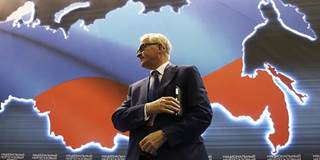It would be a mistake for countries like Russia to assume that oil prices will rise again. The recent drop in the cost of a barrel of oil is indicative of an unprecedented structural change in the energy sector – one that will have significant political implications for petroleum-producing countries.
MOSCOW – It is difficult to overstate the importance of the oil industry to the Russian economy. Globally, Russia is competitive in defense products, space launches, nuclear power, mineral resources, and information technology. But none of these industries compares to oil and gas exports. To the average Russian, the country’s economy seems to be structured around exchanging barrels of oil for cars and smartphones. The trouble, of course, is that as oil prices have plunged, those barrels buy ever fewer imports.
Oil revenues, as with revenues from most commodities, are cyclical, and sudden drops are not unusual. But it would be a mistake for countries like Russia to assume that prices will rise again. The recent drop in prices is indicative of an unprecedented structural change in the energy sector – one that will have significant political implications for oil-producing countries.
During the twentieth century, oil was a limited resource; its price, it seemed, could only go up. As easily accessible oil was exhausted, extracting from new, ever more marginal, sources became progressively more expensive. As prices rose, the lucky owners of low-cost oil and gas fields – notably Russia and producers in the Middle East– were able to capture increasingly large margins.

MOSCOW – It is difficult to overstate the importance of the oil industry to the Russian economy. Globally, Russia is competitive in defense products, space launches, nuclear power, mineral resources, and information technology. But none of these industries compares to oil and gas exports. To the average Russian, the country’s economy seems to be structured around exchanging barrels of oil for cars and smartphones. The trouble, of course, is that as oil prices have plunged, those barrels buy ever fewer imports.
Oil revenues, as with revenues from most commodities, are cyclical, and sudden drops are not unusual. But it would be a mistake for countries like Russia to assume that prices will rise again. The recent drop in prices is indicative of an unprecedented structural change in the energy sector – one that will have significant political implications for oil-producing countries.
During the twentieth century, oil was a limited resource; its price, it seemed, could only go up. As easily accessible oil was exhausted, extracting from new, ever more marginal, sources became progressively more expensive. As prices rose, the lucky owners of low-cost oil and gas fields – notably Russia and producers in the Middle East– were able to capture increasingly large margins.